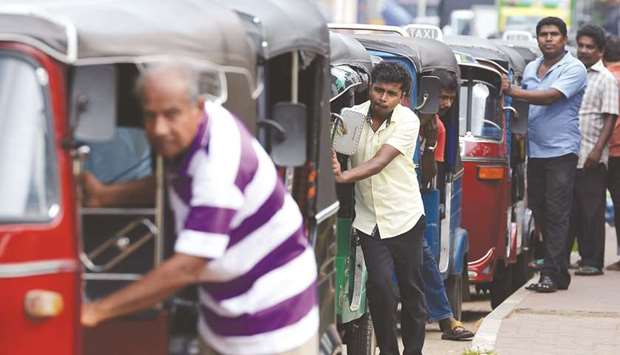But this is not what the island government wants its young people doing as 1mn jobs in booming sectors such as construction go unfilled, and businesses look abroad for labourers to get work done.
It is a puzzling scenario for Sri Lanka, which for decades has exported labour to the Middle East and reaped the foreign exchange flowing back to an island impoverished from years of war.
But now, amid an economic upswing, the government is trying to lure them back, offering competitive wages and other sweeteners to get workers into blue-collar jobs at home where they are needed.
Policymakers are also being urged to tap another source of underutilised labour: the glut of tuk-tuk drivers on Sri Lanka’s roads.
There are 1.2m auto drivers in Sri Lanka - far more than is needed for a small island of 21mn, says the union representing tuk-tuk drivers.
The United Three-Wheel Drivers and Industry Association says most of the newcomers swelling the already oversaturated ranks are young men keen to make a quick buck.
“The trend is for young people to start driving a three-wheeler no sooner they get a licence,” said Rohana Perera, association secretary of the national United Three-Wheel Drivers and Industry Association.
“If we continue like this we will not have young people to do any other job in the country.”
School leavers only need Rs50,000 ($333) for a down payment on a three-wheeler, money they can raise easily in loans from family, he added.
Priyantha was attracted to the profession after growing tired of the low pay and long hours at his regular job in a photo studio.
“I saved some money and bought a three-wheeler and now I am my own boss,” Priyantha said.
“I have more freedom and I earn twice as much.”
The union wants the government to increase the minimum working age for rickshaw drivers from Rs18 to 35 to curb the flow of new recruits flooding the overcrowded roads.
There have also been calls for an import ban on trishaws from neighbouring India to curtail supply.
The Professional Three-Wheel Drivers’ Association blames Sri Lanka’s lack of vocational training for young graduates getting behind the wheel instead of taking up better paying jobs in under filled sectors.
“Unless there are radical changes to prepare school leavers for gainful employment, they will take a short cut and start driving three-wheelers,” association’s Nishantha Perera said.
The drain of young workers into tuk-tuks compounds a labour crisis for the government, which has overseen robust economic growth since the 37-year civil war ended in 2009.
The construction industry, undergoing an unprecedented post-war boom, has been forced to turn to other countries for the 400,000 workers it needs to build the hotels and condominiums springing up in Sri Lanka’s cities.
Advertisements aimed at Nepali workers placed in industry magazines promote $450-a-month salaries plus annual return airfares and health and accident insurance.
Some construction companies are giving away motorcycles and small cars as incentives to retain skilled workers who commit to two to five years of service.
The government meanwhile hopes rising wages and economic optimism will encourage some of the estimated two million Sri Lankan workers abroad to return home and enjoy the good times.
“Already in the construction industry, the wages are comparable with what is offered in Middle Eastern countries,” said Mangala Samaraweera, Sri Lanka’s finance minister.
“I am sure many will prefer to return because they will be closer to their families and working conditions are much better here (in Sri Lanka).”
They will be sorely needed. The government expects to create more than 1mn new jobs within three years as major investments, especially in a new financial zone in the capital Colombo, begin to take shape.
Prime Minister Ranil Wickremesinghe wants Sri Lankans - whether at home or abroad - filling those vacancies.
“I am not asking for a large number of foreign workers to come in, but there should be a way of attracting our own Sri Lankans back here with higher incomes,” he said.

